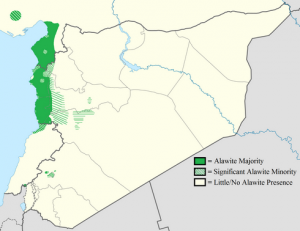SyriaBritain: Russia’s goal in Syria is to carve out Alawite mini-state for Assad
Philip Hammond, Britain’s foreign minister, has said that Russia’s real goal in Syria was to carve out an Alawite mini-state in Syria for its ally President Bashar al-Assad. Hammond said this was the reason why Russia’s massive bombing raids have targeted the Syrian opposition forces instead of fighting ISIS. Hammond’s comments offered a rare insight into the Western assessment of the Kremlin’s objectives for Syria.

Current areas of Alawite prescence // Source: commons.wikimedia.com
Philip Hammond, Britain’s foreign minister, has said that Russia’s real goal in Syria was to carve out an Alawite mini-state in Syria for its ally President Bashar al-Assad. Hammond said this was the reason why Russia’s massive bombing raids have targeted the Syrian opposition forces instead of fighting ISIS. The Syrian opposition, even if divided among many factions and militias, enjoys the support of the country’s Sunni majority and thus poses a real threat the minority Alawite regime of the Assad family.
Hammond said on Monday that Russia was worsening and prolonging the Syrian civil war by bombing opponents of ISIS.
Reuters reports that Hammond dismissed Russian criticism that he was spreading “dangerous disinformation,, saying there was a limit to how long Russia could pose as a promoter of the peace process while bombing Assad’s opponents, who are supported by the West in the hope that they would shape the post-Assad Syria.
“Is Russia really committed to a peace process or is it using the peace process as a fig leaf to try to deliver some kind of military victory for Assad that creates an Alawite mini state in the north-west of Syria?” Hammond told reporters in Rome.
Newsweek reports that the comments are evidence of growing Western frustration with what Western capitals consider to be Russia’s and Iran’s disruptive intervention in Syria, alongside Iran. They also offer a rare insight into the Western assessment of the Kremlin’s objectives for Syria.
Russia began its air strikes in September in order to save the Assad regime from what appeared to be an imminent defeat after a series of major setbacks during the first half of 2015. The opposition’s forces advances in north-west Syria brought major Alawite cities within range of the opposition’s artillery, and the Syrian army, now composed almost exclusively of Alawites, was in a state of disintegration.
Hammond, when asked about the Russian criticism, responded: “Sounds like I must be pretty much spot on.”
Hammond added that Russia was strengthening ISIS on the ground by propping up Assad and bombing his opponents, in the process driving moderate Sunnis into the hands of militants.
“There has to be a limit to the amount of time that the Russians can sit at the negotiating table posing as sponsors of the political track while at the same time bombing the people who we believe have to be the future of Syria,” he said.
Asked whether he thought Russia was guilty of war crimes in Syria, Hammond said: “On the face of it, and you have to investigate these things very carefully, there is indiscriminate bombing of civilian areas going on and, on the face of it, that would represent a breach of international humanitarian law.”
